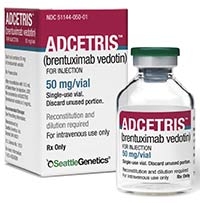Product
Adcetris
Approval Date
August 19, 2011
Release Date
August 29, 2011
Company
Seattle Genetics
Class
Antibody-drug conjugate comprising an anti-CD30 monoclonal antibody attached by a protease-cleavable linker to a microtubule disrupting agent, monomethyl auristatin E (MMAE)
Indication
For the treatment of patients with Hodgkin lymphoma after failure of autologous stem cell transplant (ASCT) or after failure of at least two prior multi-agent chemotherapy regimens in patients who are not ASCT candidates; and for the treatment of patients with systemic anaplastic large cell lymphoma (ALCL) after failure of at least one prior multi-agent chemotherapy regimen
Active Ingredient
Brentuximab vedotin
Agency Roster
The Navicor Group (pro)
Marketing Strategy/Execution
Seattle Genetics has been running professional disease-awareness advertising at medical congresses to upend a popular myth about Hodgkin’s disease therapy. As one non-branded ad with the headline “No Good Cancer” emphasizes, Hodgkin lymphoma (HL) is viewed in oncology circles as a success story. However, stats suggest otherwise: refractory and relapse rates are 10% and 30%, respectively, and 50% of stem cell transplants for the disease fail. The ad hints at an “important refinement” in therapy. Of course, newly approved Adcetris, the first FDA-approved therapy for HL in 30 years, promises to be it. At a cost of about $108,000 a year, though, that advance won’t come cheap. Seattle Genetics has US and Canadian commercialization rights, and the Takeda Group has rights to commercialize Adcetris in the rest of the world.
Physician Outlook
Adcetris, an anti-CD30 monoclonal antibody attached to a microtubule disrupting agent, has been granted accelerated approval by the FDA, based on phase II data, for use in for refractory or resistant Hodgkin’s lymphoma (rHL) and refractory and resistant anaplastic large cell lymphoma (rALCL). Patients in these two indications have few therapeutic options, so Adcetris fills an urgent unmet need. Adcetris demonstrates impressive objective response rates when used alone in either of these two patient populations; however there are currently no data available regarding survival or patient outcomes. The linker between the antibody and the cytotoxic agent is stable in the blood and only released when Adcetris is internalized by the tumor cells. It represents the first in a new class of improved antibody drug conjugates with a mechanism of action that could be extended to numerous other cancers in the future.
—Rishard Salie, PhD, project manager, GfK HealthCare, Oct. 2011
Also in the Pipeline (courtesy of Adis R&D Insight)
Drug: Afinitor
Manufacturer: Novartis
Indication: Refractory or relapsed Hodgkin’s lymphoma that has progressed after high-dose chemotherapy and autologous stem cell transplant and/or after gemcitabine- or vinorelbine- or vinblastine-based treatment
Active Ingredient: Everolimus
Phase: II
Source: Wolters Kluwer Pharma Solutions
Recent MM&M Coverage
The Top 75: The Navicor Group
Pharmacology
Detailed clinical information withheld for review by MPR’s clinical advisory board and will be added as soon as it becomes available.
Clinical Trials
Detailed clinical information withheld for review by MPR’s clinical advisory board and will be added as soon as it becomes available.
Adverse Reactions
Detailed clinical information withheld for review by MPR’s clinical advisory board and will be added as soon as it becomes available.
Adults
Detailed clinical information withheld for review by MPR’s clinical advisory board and will be added as soon as it becomes available.
Children
Detailed clinical information withheld for review by MPR’s clinical advisory board and will be added as soon as it becomes available.
Precautions
Detailed clinical information withheld for review by MPR’s clinical advisory board and will be added as soon as it becomes available.









